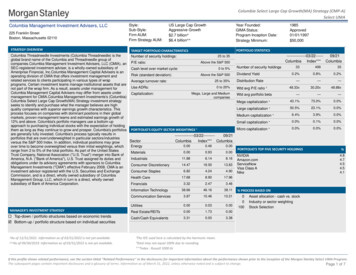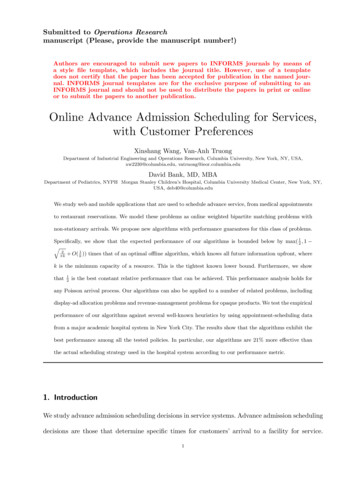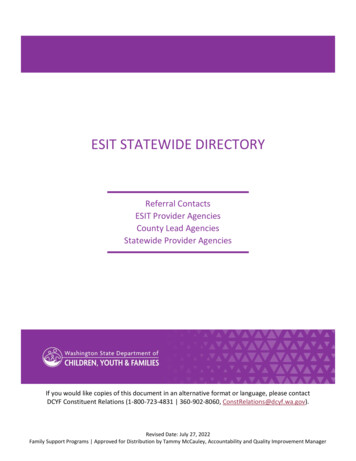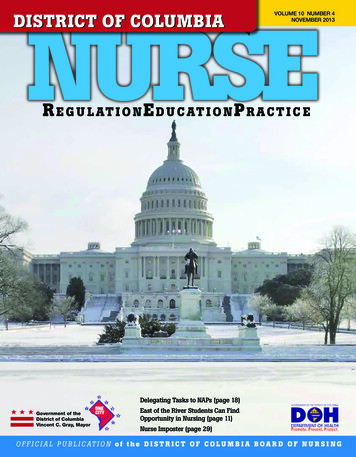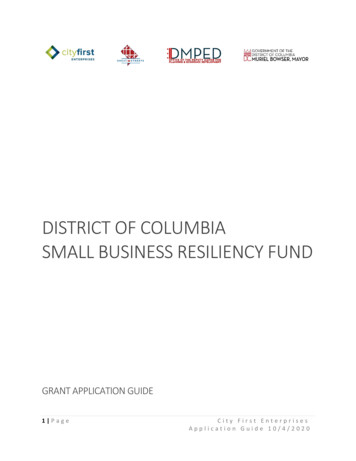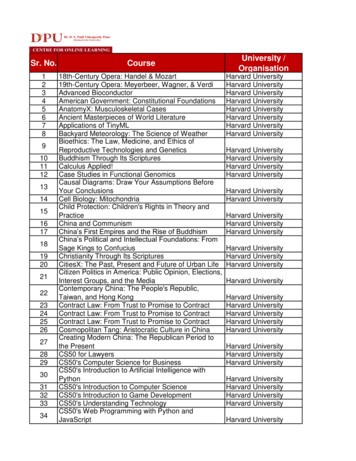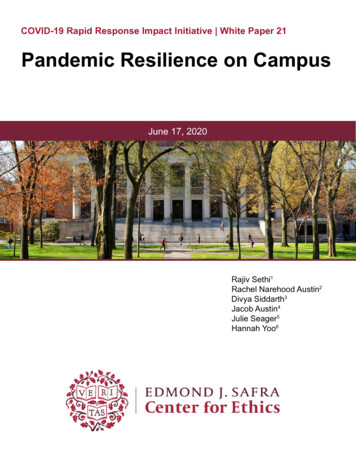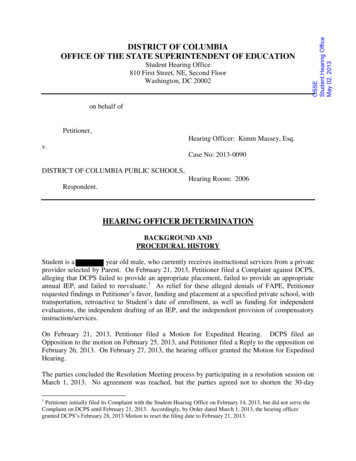
Transcription
Student Hearing Office810 First Street, NE, Second FloorWashington, DC 20002OSSEStudent Hearing OfficeMay 02, 2013DISTRICT OF COLUMBIAOFFICE OF THE STATE SUPERINTENDENT OF EDUCATIONon behalf ofPetitioner,Hearing Officer: Kimm Massey, Esq.v.Case No: 2013-0090DISTRICT OF COLUMBIA PUBLIC SCHOOLS,Hearing Room: 2006Respondent.HEARING OFFICER DETERMINATIONBACKGROUND ANDPROCEDURAL HISTORYStudent is ayear old male, who currently receives instructional services from a privateprovider selected by Parent. On February 21, 2013, Petitioner filed a Complaint against DCPS,alleging that DCPS failed to provide an appropriate placement, failed to provide an appropriateannual IEP, and failed to reevaluate.1 As relief for these alleged denials of FAPE, Petitionerrequested findings in Petitioner’s favor, funding and placement at a specified private school, withtransportation, retroactive to Student’s date of enrollment, as well as funding for independentevaluations, the independent drafting of an IEP, and the independent provision of compensatoryinstruction/services.On February 21, 2013, Petitioner filed a Motion for Expedited Hearing. DCPS filed anOpposition to the motion on February 25, 2013, and Petitioner filed a Reply to the opposition onFebruary 26, 2013. On February 27, 2013, the hearing officer granted the Motion for ExpeditedHearing.The parties concluded the Resolution Meeting process by participating in a resolution session onMarch 1, 2013. No agreement was reached, but the parties agreed not to shorten the 30-day1Petitioner initially filed its Complaint with the Student Hearing Office on February 14, 2013, but did not serve theComplaint on DCPS until February 21, 2013. Accordingly, by Order dated March 1, 2013, the hearing officergranted DCPS’s February 28, 2013 Motion to reset the filing date to February 21, 2013.
resolution period. Therefore, the 45-day timeline began on March 24, 2013 and will end on May7, 2013, which is the HOD deadline.On March 5, 2013, DCPS filed its Response, which asserted the following: (i) A 10/17/10 PriorWritten Notice identified Private School A as Student’s location of services and an 8/20/09 IEPwas created that identified Student as having multiple disabilities and needing a full-time outsideof general education placement; (ii) Petitioner filed a 9/13/10 Complaint for reimbursement andprospective funding for a unilateral placement; an 11/10/10 HOD found against Petitioner; andPetitioner appealed but did not move to stay the HOD’s Order, which required DCPS to convenean IEP meeting, so DCPS attempted to move forward with the IEP meeting; (iii) DCPS madenumerous attempts after 11/23/10 to obtain parental participation in a meeting and eventuallymoved forward on 6/15/11 without Parent; (iv) The IEP team carried over Student’s goals fromthe previous IEP and once again identified Private School A as the location of services; (v) At nopoint from 11/10/10 to 2/21/13 did Petitioner notify DCPS that she was seeking FAPE forStudent, or that she was seeking funding for the unilateral placement for the remainder of SY10/11, SY 11/12, or SY 12/13; (vi) The US District Court ordered reimbursement for the privateplacement for 10/11, but found that prospective funding was not appropriate and recommendedthat the MDT/IEP team determine placement for SY 12/13; and (vii) It was only with the filingof the instant Complaint that Petitioner provided notification that she wants DCPS to provide aFAPE to this parentally placed private student. DCPS also denied the claims asserted,maintained the relief requested was unwarranted, and asserted that the Complaint should bedismissed with prejudice.On March 7, 2013, the hearing officer convened a prehearing conference and led the partiesthrough a discussion of the issues, relief requested, and other relevant topics. The hearing officerissued a Prehearing Order on March 11, 2013.By letter dated March 3, 2013, which was actually submitted on April 3, 2013, Petitionerdisclosed six documents (Petitioner’s Exhibits 1-6), and by letter dated April 3, 2013, DCPSdisclosed eleven documents (Respondent’s Exhibits 1-11).Also on April 3, 2013, Petitioner filed a brief regarding the statute of limitations and whether itbars Petitioner’s claim for reimbursement for SY 2010/11. DCPS filed its Reply Brief on April8, 2013. The hearing officer received further argument from the parties regarding the potentialbar of the statute of limitations at the hearing, and Petitioner conceded that IDEA’s two-yearstatute of limitations precludes it from pursuing its IEP and reevaluation claims for the periodpreceding February 21, 2011, because Petitioner’s federal court appeal did not relate to thoseissues.On April 5, 2013, Petitioner filed its objections to DCPS’s disclosures. On April 8, 2013, DCPSfiled its objections to Petitioner’s disclosures.The hearing officer convened the due process hearing on April 10, 2013.2 The hearing officeroverruled the parties’ objections to each other’s disclosures and admitted all disclosed documentsinto the record. During argument on the statute of limitations issue, Petitioner conceded that2Counsel for each party and the witnesses for each party are listed in the Appendix that accompanies this decision.2
IDEA’s statute of limitations precludes consideration of Student’s IEP and reevaluation claimsbeyond the two-year limitations period, because Petitioner’s pending appeal had no effect onthose issues. Petitioner also indicated that it did not wish to pursue its IEP claim for any yearother than SY 2012/13. Thereafter, both parties waived the right to make an opening statement,the hearing officer received testimonial evidence from Petitioner and DCPS rested on the record.After receiving closing arguments from both parties, the hearing officer concluded the hearing.The due process hearing was convened and this Hearing Officer Determination is writtenpursuant to the Individuals with Disabilities Education Improvement Act (“IDEA”), 20 U.S.C.§§ 1400 et seq., the implementing regulations for IDEIA, 34 C.F.R. Part 300, and Title V,Chapter 30, of the District of Columbia Municipal Regulations (“D.C.M.R.”).ISSUE(S)The issues to be determined are as follows:1. Did DCPS fail to provide an appropriate school placement for Student by failing toprovide any placement at all after October 2010?2. Did DCPS fail to provide an appropriate annual IEP for Student for SY 2012/13?3. Did DCPS fail to reevaluate Student since February 2011?FINDINGS OF FACT3After considering all the evidence, as well as the arguments of both counsel, this HearingOfficer’s Findings of Fact are as follows:1. Student isyears old. He currently receives instructional services from aprivate provider selected by Parent.42. Student suffers from multiple disabilities, including a non-verbal learning disability,cerebral palsy, impaired motor skills, and an adjustment disorder.53. Student’s August 20, 2009 IEP indicated that Student has multiple disabilities andrequired Student to receive the following special education and related services eachweek: 26 hours of specialized instruction; 60 minutes of adapted physical education;120 minutes of behavioral support services; 60 minutes of occupational therapy; 903To the extent that the hearing officer has declined to base a finding of fact on a witness’s testimony that goes to theheart of the issue(s) under consideration, or has chosen to base a finding of fact on the testimony of one witnesswhen another witness gave contradictory testimony on the same issue, then the hearing officer has taken such actionbased on the hearing officer’s determinations of the credibility and/or lack of credibility of the witness(es) involved.4Testimony of Parent.5Petitioner’s Exhibit 2 at 3, ¶ 2.3
minutes of speech-language pathology; and 27.5 hours of school health and schoolnursing, with all services to have been provided outside general education. The IEPalso required Student to receive 30 minutes per day of occupational therapyconsultation services and 45 minutes per day of speech/language consultationservices.64. Student has not been evaluated by DCPS since 2009.75. On May 28, 2010, Petitioner filed a Complaint against DCPS, alleging, inter alia, thatDCPS had failed to provide an appropriate placement for Student for SY 2010/11.Thereafter, Petitioner enrolled Student as a non-attending student at his neighborhoodDCPS school on August 17, 2010, and Petitioner enrolled Student at the privateschool of her choice on September 6, 2010.86. On September 13, 2010, Petitioner filed another Complaint against DCPS. At thetime, DCPS was 23 days late in preparing a new IEP for Student.97. On October 17, 2010, DCPS issued a Prior Written Notice (“PWN”) that assignedStudent to attend Private School A.108. The hearing officer assigned to determine Petitioner’s September 13, 2010 complaintdenied Petitioner’s requests for relief, noting, inter alia, that a location of services hadbeen identified prior to the due process hearing, even though the private placement byParent was appropriate.11 The hearing officer ordered DCPS to convene an IEP teammeeting for student within 30 days after the issuance of November 10, 2010 hearingofficer decision.129. Petitioner appealed to the U.S. District Court for the District of Columbia, arguing,inter alia, that DCPS had a duty to provide an appropriate placement and school forStudent to attend for SY 2010/11. The Court ultimately ruled that DCPS deniedStudent a FAPE by failing to timely update Student’s IEP and by placing Student atPrivate School A without input from Petitioner. On August 24, 2012, the Courtissued a Memorandum and Order that remanded the matter to the hearing officer todetermine whether the amount of tuition Petitioner sought as reimbursement forStudent to attend her private school of choice was appropriate and reasonable, but theCourt denied Petitioner’s request for prospective funding for the private school on theground that the prospective placement for Student for SY 2012/13 should beaddressed by the MDT/IEP team.136Petitioner’s Exhibit 1.Testimony of Parent; see also testimony of special education advocate.8Petitioner’s Exhibit 2 at 4, ¶¶ 9, 10, 12.9Petitioner’s Exhibit 2 at 4, ¶ 14.10DCPS Response at ¶ 2; Complaint at ¶ 4; Petitioner’s Exhibit 2 at 5, ¶ 15.11See Petitioner’s Exhibit 2 at 5-6.12Petitioner’s Exhibit 2 at 19.13Petitioner’s Exhibit 2.74
10. On November 30, 2010, DCPS began inquiring in emails to Petitioner’s counselwhether Petitioner intended to enroll Student at Private School A. Petitioner’scounsel initially responded that Parent had spoken with the school and was waitingfor confirmation that Student could attend. DCPS indicated that its PWN wasconfirmation of Student’s ability to attend the school. Following a December inquiryby DCPS regarding Student’s enrollment at Private School A, Petitioner’s counseladvised that Parent had visited the school and found there was no class available forStudent. Counsel also asked for authorization to place Student at Parent’s privateschool of choice, but DCPS did not agree to the request. Ultimately, Petitioner neverenrolled Student at Private School A.1411. On November 23, 2010, DCPS emailed Petitioner’s counsel to propose dates andtimes for an MDT meeting for Student. Petitioner’s counsel indicated that Petitionerwould participate if DCPS could provide a “real teleconference,” as opposed toseveral different speakerphones. Ultimately, however, the meeting did not goforward and the parties began attempting to reschedule for February 2011. In the end,Petitioner’s counsel suggested that Student’s private providers prepare a draft IEPthat could be sent to DCPS for approval. On February 23, 2011, Petitioner’s counselsuggested postponing or forgoing the MDT meeting and stated that Petitioner waswaiving the meeting timeline to allow the outside providers to draft the IEP, whichPetitioner would then send to DCPS and if DCPS found the IEP acceptable, therewould be no need for a meeting and Petitioner would waive the meeting entirely.1512. On March 24, 2011, DCPS inquired of Petitioner’s counsel by email whether counselhad obtained IEP goals for Student from the private providers. Then in May, DCPSonce again proposed dates for an MDT meeting. Petitioner’s counsel failed torespond; DCPS contacted Parent directly, but Parent instructed DCPS tocommunicate through Petitioner’s counsel.Ultimately, DCPS indicated toPetitioner’s counsel on June 13, 2011 that the meeting would be held on 6/15/11unless counsel responded the following day.1613. Parent knew DCPS was trying to schedule an MDT meeting for Student, because aDCPS representative called Parent and Parent directed DCPS to contact herattorney.1714. On June 15, 2011, DCPS convened an MDT meeting for Student. Parent did notattend the meeting, but DCPS called her and left a message. The team determined notto make any changes to Student’s IEP because he had not attended a DCPS school,charter school or non-public school since SY 2008/9. The team noted that DCPS hadmade attempts to contact Parent and her attorney but had not heard anything from the14See Petitioner’s Exhibit 3.See Petitioner’s Exhibit 3; see Respondent’s Exhibits 10-11.16See Petitioner’s Exhibit 3; see Respondent’s Exhibits 10-11.17Testimony of Parent.155
attorney since March 29, 2011, and that DCPS offered to place and fund Student atPrivate School A but that offer was rejected by Parent and the attorney.1815. DCPS issued an IEP for Student on June 15, 2011. As with Student’s August 20,2009 IEP, this IEP also required Student to receive the following special educationand related services each week: 26 hours of specialized instruction; 60 minutes ofadapted physical education; 120 minutes of behavioral support services; 60 minutesof occupational therapy; 90 minutes of speech-language pathology; and 27.5 hours ofschool health and school nursing, with all services to have been provided outsidegeneral education. The IEP also required Student to receive 30 minutes per day ofoccupational therapy consultation services and 45 minutes per day of speech/languageconsultation services.1916. Parent has not received any invitations to an MDT meeting since the June 2011meeting.2017. Parent did not enroll Student in any DCPS school for SY 2011/12.2118. Parent kept Student at home for SY 2011/12 and paid for online classes, homeschooled Student, and relied upon other resources to educate Student. Student alsoreceived services from his cognitive skills coach, his speech/language pathologist,and his vision and conceptual development specialist, which are paid for via medicalbenefits.2219. On October 31, 2012, Parent attempted to register Student in the autism program at aDCPS high school outside of her boundary area. Parent’s intent was to move into theboundary area for the school, but the school’s SEC advised Parent that Student couldnot be registered as a non-attending student, Student would have to attend regulareducation classes for 30 days before a determination of whether to move him tospecial education could be made, and the IEP Parent’s educational advocate preparedcould not be implemented at the school.2320. In November 2012, a hearing officer conducted a hearing on remand to determine theamount of reimbursement to be awarded to Petitioner in connection with theSeptember 2010 Complaint.2421. Parent did not attempt to register Student at the neighborhood DCPS school for SY2012/13. However, after the hearing officer awarded Parent reimbursement onremand for Student’s private school fees for SY 2010/11 and the private school18Respondent’s Exhibit 5.Respondent’s Exhibit 6.20Testimony of Parent.21Testimony of Parent.22Testimony of Parent.23Testimony of Parent.24Testimony of Parent.196
received payment, Parent was able to re-enroll Student in the private school andStudent began receiving services on February 12, 2013.2522. At the March 1, 2013 resolution session for the instant case, Parent signed a Consentform for a reevaluation of Student. However, as of the date of the due processhearing, no assessments had been scheduled.2623. Student’s current private provider is the same private provider who provided servicesto Student during SY 2010/11, the program is essentially the same online programthat allows children to proceed at their own rate, and if awarded full-time fundingStudent would be able to receive the same amount of specialized instruction hereceived during SY 2010/11 – namely, 15 to 18 hours per week.2724. Student is currently receiving only part-time services through the private provider dueto Petitioner’s inability to provide funding for full-time services. Nevertheless,Student is doing very well with the material the private provider is teaching him.Student is earning high 90s on his quizzes on average, and he has gone from notremembering basic math concepts to working on pre-Algebra.2825. Student’s current private placement is reasonably calculated to allow Student toreceive educational benefits.26. As of the date of the due process hearing in this case, Parent owed the privateprovider 1,785.00.2927. As compensatory education for Student, Petitioner has requested the following: (i) tocompensate for 5 months missed/awarded, 150 hours of online instruction through theWECA Electrician Trainee Program, which includes an apprenticeship, to be begun atStudent’s discretion when appropriate after obtaining an academic foundation; (ii) tocompensate for the next 3 months missed/awarded, computer hardware and softwareconsisting of a laptop of Student’s choosing up to 1,500, printing/scanning hardwareup to 500, and an 8 months subscription to Brain Pro Autism software for 4,200;and (iii) to compensate for any more months missed/awarded, tutoring and coachingwith a focus on vocational and life skills, to be provided by independent tutor(s) andcoach(es) of the choosing of parent or Student at a rate of up to 100/hour, in theamount of 30 hours for each month missed/awarded. 3028. Petitioner’s compensatory education plan is based on the services Student would havereceived had he been in an appropriate school program, which includes vocationaltraining that Student became eligible to receive beginning at age 16. Moreover, as25Testimony of Parent.Testimony of Parent; Respondent’s Exhibit 4.27Testimony of educational consultant.28Testimony of educational consultant.29Testimony of educational consultant.30Petitioner’s Exhibit 4; see testimony of special education advocate.267
Student has cerebral palsy, nonverbal learning disabilities, and impaired motor skills,he cannot carry a lot of books and needs compact devices such as a laptop computerand a small printer that he can carry around with him.3129. Petitioner’s proposed compensatory education plan is designed to place Student in thesame position he would have occupied but for any violations of IDEA by DCPS.CONCLUSIONS OF LAWBased upon the above Findings of Fact, the arguments of counsel, as well as this HearingOfficer’s own legal research, the Conclusions of Law of this Hearing Officer are as follows:1. Statute of Limitations Regarding SY 2010/11Under IDEA, a due process complaint must allege a violation that occurred not more than twoyears before the date the parent or public agency knew or should have known about the allegedaction that forms the basis of the complaint. 34 C.F.R. § 300.507(a)(2); see also 34 C.F.R. §300.511(e). However, this two-year timeline does not apply if the parent was prevented fromfiling a due process complaint due to specific misrepresentations by the LEA that it had resolvedthe problem forming the basis of the due process complaint, or the LEA’s withholding ofinformation form the parent that was required to be provided to the parent. 34 C.F.R. §300.511(f).IDEA also permits any party aggrieved by a hearing officer’s decision on a due processcomplaint to file a civil action with respect to the complaint in any State court of competentjurisdiction or in a district court of the United States without regard to the amount in controversywithin 90 days of the date of the hearing officer’s decision. See 34 C.F.R. § 300.516(a)-(b).In the instant case, Petitioner argues that IDEA’s two-year statute of limitations does notpreclude Petitioner from pursuing her placement/location of services claim for SY 2010/11because Petitioner appealed the hearing officer’s November 2010 decision that DCPS had notfailed to provide an appropriate placement for Student to a federal court, which did not issue adecision on the case until November 21, 2012, thereby precluding Petitioner from pursuing theclaim before that time.Not surprisingly, DCPS disagrees with Petitioner and argues that an appeal of a hearing officer’sdecision does not toll the two-year limitations period, and it does not stay further proceedingsunless such a request is expressly made to the Court, which Petitioner failed to do in this case.Upon consideration of the record, the hearing officer has determined that Petitioner’s claim foran inappropriate placement for SY 2010/11 is barred by the doctrine of res judicata, becauseboth the federal court and the hearing officer have already rendered decisions on the merits withrespect to that claim. In this regard, the federal court specifically noted that “Plaintiff argues thatDCPS had a duty to provide appropriate placement, including a school for [Student] to attend,31See testimony of special education advocate.8
for the 2010-11 school year,” and the court specifically held that “DCPS unilaterally updated[Student’s] IEP for the 2010-11 school year when it proposed [the private school] as thelocation for [Student’s] IEP to be implemented.” Petitioner’s Exhibit 2 at 8 and 15 (emphasisadded). As a result, this claim has already been fully litigated, and Petitioner is precluded fromrelitigating the claim in the instant action. See Allen v. McCurry, 449 U.S. 90, 94 (1980)(citation omitted) (a final judgment on the merits of an action precludes relitigating issues thatwere raised in that action). Under these circumstances, the hearing officer finds it unnecessary todecide whether the claim is barred by IDEA’s statute of limitations.2. School PlacementUnder IDEIA, a public agency must provide an appropriate educational placement for each childwith a disability, so that the child’s needs for special education and related services can be met.See 34 C.F.R. § 300.17; 34 C.F.R. §§ 300.114-300.120. In this regard, a FAPE consists ofspecial education and related services that, inter alia, include an appropriate secondary schooland are provided in conformity with the Student’s IEP. See 34 C.F.R. § 300.17.In determining a disabled child’s educational placement, the LEA must ensure that the placementdecision is, inter alia, made by a group of persons that includes the parents and is made inconformity with IDEA’s least restrictive environment regulations. 34 C.F.R. § 300.116(a)(1).Moreover, the disabled child’s placement must be determined at least annually. See 34 C.F.R. §300.116(b)(1).Although IDEA guarantees a free appropriate education, it does not, provide that this educationwill be designed according to the parent’s desires. Shaw v. District of Columbia, 238 F.Supp. 2d127 (D.D.C. 2002)(citation omitted). Accordingly, the primary responsibility for formulating theeducation to be accorded a handicapped child, and for choosing the educational method mostsuitable to the child’s needs, was left by IDEA to state and local educational agencies incooperation with the parents or guardian of the child. Hendrick Hudson Central School District,Westchester County, et. al. v. Rowley, 458 U.S. 176, 207 (1982). In addition, an IEP teammeeting may be conducted without a parent in attendance if the LEA is unable to convince aparent to participate. 34 C.F.R. § 300.322(d).In the instant case, Petitioner argues that DCPS denied Student a FAPE by failing to make anyplacement at since October 2010. As the hearing officer has already determined that Petitioner’sclaim for SY 2010/11 is barred by res judicata, the hearing officer will restrict the instantanalysis to SY 2011/12 and SY 2012/13.A review of the record in this case reveals that on October 17, 2010, DCPS issued a PWN thatassigned Student to attend Private School A for SY 2010/11. Thereafter, a November 10, 2010HOD upheld the PWN, but ordered DCPS to convene a meeting within 30 days of the issuanceof the HOD. Beginning November 23, 2010 DCPS began emailing Petitioner’s counsel topropose dates for the required MDT meeting. Petitioner’s counsel eventually suggested thatPetitioner could have Student’s private providers prepare a draft IEP, and Petitioner waived thetimeline for the meeting with a suggestion that it might ultimately waive the meeting altogether.When Petitioner’s counsel failed to produce the agreed upon independent IEP, DCPS again9
began proposing dates for the meeting. When Petitioner’s counsel failed to respond and DCPScontacted Petitioner directly, Petitioner advised DCPS to communicate directly with Petitioner’scounsel. When Petitioner’s counsel continued to be unresponsive, DCPS scheduled the IEPmeeting for June 15, 2011 and proceeded with the meeting as scheduled. Even then, however,DCPS called Parent on June 15, 2011 to give her an opportunity to participate in the meeting andleft her a message. At the meeting, which Parent and her counsel failed to attend, DCPSdetermined not to make any changes to Student’s IEP since he had not attended a DCPS school,charter school or non-public school since SY 2008/9, and DCPS restated its offer to place andfund Student at Private School A but noted the offer had been rejected by Parent and her counsel.Based on the evidence outlined above, the hearing officer concludes that DCPS did not fail tooffer any educational placement at all for Student for SY 2011/12, because the June 15, 2011 IEPand offer of educational placement were in place for SY 2011/12 through June 15, 2012, and theuntimeliness of the June 15, 2011 meeting was due in large part to the failure of Petitioner andher counsel to participate in the scheduling of the meeting. See 34 C.F.R. § 300.116(b)(2)(placement must be determined at least annually); 34 C.F.R. § 300.324(b)(1)(i) (IEP must bereviewed at least annually); 34 C.F.R. § 300.322(d) (IEP team meeting may be conductedwithout parent if LEA is unable to convince parent to participate). Hence, Petitioner has failed tomeet its burden on this claim with respect to SY 2011/12. See Schaffer v. Weast, 546 U.D. 49(2005) (burden of proof in administrative hearing is on party seeking relief).With respect to SY 2012/13, the evidence in this case shows that although the federal courtissued a remand Order concerning Student in August 2012 and a hearing officer conducted ahearing on remand in November 2012, DCPS failed to convene an MDT meeting for Student onor about June 15, 2012 or at any point afterwards. DCPS argues that Parent was required to givenotice of her desire for a FAPE for Student in SY 2012/13, which would have then triggeredDCPS’s obligations to provide a FAPE. However, IDEA requires DCPS to make FAPEavailable to all children residing in the District of Columbia between the ages of 3 and 21,including disabled children who have been suspended or expelled from school. 34 C.F.R. §300.101(a); see also D.S. v. District of Columbia, 699 F. Supp.2d 229 (D.D.C. 2010) (residencyin the District, not enrollment in school, is what triggers the obligation to make FAPE availableto disabled children in the District). As there is no dispute that (1) Student is a resident of theDistrict of Columbia, and (2) DCPS failed to assign Student an educational placement for SY2012/13, the hearing officer concludes that Petitioner has met its burden of proof on this claimwith respect to SY 2012/13. Accordingly, the hearing officer will order DCPS to convene anMDT meeting for Student within 15 days of the issuance of this decision to assign Student aneducational placement where his IEP can be implemented for SY 2013/14 and Summer 2013 ifappropriate, and the hearing officer will order DCPS to provide funding for Student’s currentprivate provider from Student’s enrollment date of February 12, 2013 through the end of SY2012/13. See N.G. v. District of Columbia, 556 F.Supp.2d 11 (D.D.C. 2008) (citations omitted)(if public school defaults on obligations under IDEA, private school placement proper ifreasonably calculated to enable child to receive educational benefits).10
3. Annual IEPIDEA requires that each disabled child’s IEP be reviewed periodically, but not less thanannually, at least annually, to determine whether the child’s annual goals are being achieved. 34C.F.R. § 300.324(b)(1)(i). The IEP must also be revised as appropriate to address any lack ofexpected progress toward the annual goals and in the general curriculum, if appropriate, theresults of any reevaluation, information about the child provided to or by the parents, the child’santicipated needs, or other matters. 34 C.F.R. § 300.324(b)(1)(ii).In the instant case, Petitioner contends that DCPS denied Student a FAPE by failing to providehim with an appropriate annual IEP for SY 2012/13. The evidence in this case reveals thatStudent’s most recent IEP is dated June 15, 2011. The hearing officer has already determinedabove that DCPS failed to convene an MDT meeting for Student on or about June 15, 2012 or atany point afterwards, and the hearing officer has already rejected DCPS’s argument that Parentwas required to give notice of her desire for a FAPE for Student in SY 2012/13, therebytriggering DCPS’s obligations to provide a FAPE. Under these circumstances, the hearingofficer concludes that Petitioner has met its burden of proof on this claim. See Honig v. Doe,484 U.S. 305, 3011 (1988) (IEP is primary vehicle for implementing IDEA); Alston v. District ofColumbia, 439 F.Supp.2d 86, 90 (
school of choice, but DCPS did not agree to the request. Ultimately, Petitioner never enrolled Student at Private School A.14 11. On November 23, 2010, DCPS emailed Petitioner's counsel to propose dates and times for an MDT meeting for Student. Petitioner's counsel indicated that Petitioner
